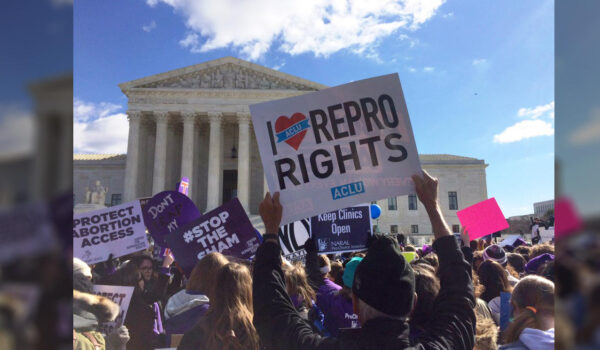Federal Appeals Court Strikes Down Abortion Restrictions in Wisconsin
Decision Comes as the Supreme Court Grants Review of Similar Texas Law
MADISON, Wis. — Marking an important victory for Wisconsin women, the U.S. Court of Appeals for the 7th Circuit today rejected the state’s efforts to reinstate an unconstitutional restriction on access to abortion. This comes just over a week after the a Fifth Circuit Court of Appeals decision upholding similar restrictions in Texas that have devastated access to safe, legal abortion across the state.
Today’s decision affirmed the decision of U.S. District Court Judge William Conley that the admitting privileges law would place an undue burden on women’s access to safe and legal abortion. The court wrote in today’s opinion: “…what makes no sense is to abridge the constitutional right to an abortion on the basis of spurious contentions regarding women’s health—and the abridgment challenged in this case would actually endanger women’s health.” The order continues, “Opponents of abortion reveal their true objectives when they procure legislation limited to a medical procedure—abortion—that rarely produces a medical emergency.”
Only four health centers provide abortion in Wisconsin. If this law were permitted to take effect, one of those health centers will be forced to close immediately, and the remaining three will not be able to absorb the unmet need. This could delay procedures by up to 10 weeks, forcing abortions later in pregnancy, if a woman is able to have one at all.
In Texas, researchers found that , without medical assistance, due to restricted access to safe, legal abortion. Additional research in Texas revealed that existing abortion restrictions have delayed procedures for women by up to 20 days, and threaten to . While abortion is an extremely safe procedure, it is safest earlier in pregnancy.
Similar laws attacking women’s access to safe and legal abortion have been enjoined by state and federal courts in Alabama, Louisiana, and Oklahoma.
“Today, the federal appeals court in Wisconsin recognized what the medical experts have been saying all along: These laws aren’t about protecting women’s health, they are about shutting down clinics and preventing a woman who has decided to have an abortion from actually getting one,” said Jennifer Dalven, director of the ACLU’s Reproductive Freedom Project.
“This is an important victory for women's health and rights, and a rejection of political interference into women's most personal medical decisions. We are grateful that the court has ruled to protect access to safe, legal abortion for women in Wisconsin,” said Cecile Richards, president, Planned Parenthood Federation of America. “Laws restricting abortion hurt women — as we’ve seen in states like Texas, where restrictions are already forcing women to end pregnancies on their own, without medical assistance. This is what we all feared would happen, and we're deeply concerned that we'll see this more and more if the Supreme Court does not intervene.”
“For 80 years, PPWI has been providing high-quality, affordable, nonjudgmental care, and we will continue to make sure people in our state have access to the health care they deserve — no matter what,” stated Teri Huyck, President and CEO of Planned Parenthood of Wisconsin.
The law imposes a requirement that doctors who provide abortion obtain hospital admitting privileges at a local hospital. Data, including from the Centers for Disease Control and Prevention (CDC), shows that abortion has over a 99 percent safety record. The plaintiffs in this case already have plans in place for patient safety. Emergency rooms provide care if necessary, and all Wisconsin abortion clinics already have made arrangements with local hospitals in the extremely rare case that a patient needs hospital care.
The American College of Obstetricians and Gynecologists, Wisconsin Medical Society, the Wisconsin Hospital Association, the Wisconsin Public Health Association, the Wisconsin Academy of Family Physicians, the Wisconsin Association of Local Health Departments and Boards, and the Wisconsin Alliance for Women’s Health all the law. In fact, at the federal trial an independent, court-appointed medical expert said of this law, “I think it is an unacceptable experiment to see if you decrease access (to abortion) and see if more women die. It is not acceptable. It is not ethical. People will resort to illegal abortions.”
The case was brought on by Planned Parenthood Federation of America, the ACLU, and the ACLU of Wisconsin on behalf of Planned Parenthood of Wisconsin and Affiliated Medical Services.


